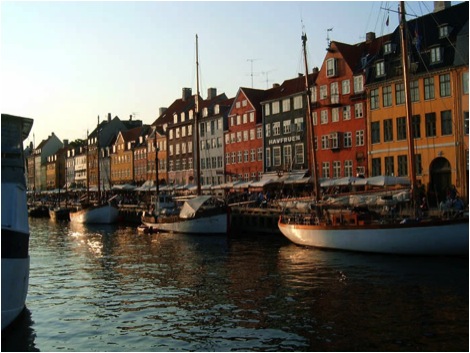By CHRIS KELSEY
The first time I visited Copenhagen I decided to quit my job. I had spent five years working nearly 60 hours per week as an editor, I never took vacation, I was struggling with finances, and I was deeply unhappy. My parents, who were closing in on retirement, had been to Ireland not long before and the travel bug for Europe had struck. Now they chose Denmark. To my good fortune, they treated their three adult children to this August trip.
**
In the summer, Copenhagen’s Nyhavn Canal is crowded with travelers from all over the world. The old, brightly painted buildings house pubs and tattoo shops and high-priced apartments. Canal boat tours run steadily. The outdoor seats at the waterside restaurants blend together and the tourists share tables. It’s difficult to know which restaurant you’re at, but it doesn’t really matter. You eat open-faced sandwiches, salads, maybe a sausage. You drink a pint of Tuborg or a glass of wine.

Nyhavn was once a sailors’ haven and had an edgier character before tourism and gentrification—much like New York’s Times Square. Even the adjacent “free city” zone of Christiania now houses some of the city’s most expensive dwellings.
During that first visit, I noticed a basement shop with a handwritten sign on the door. In English, it paid homage to the neighborhood’s saltier past: “Massage ONLY. No sex.”
**
As I sat harborside, I watched the sun come up on the Opera House. The sharply angled roof reminded me of a pulp mystery fedora. A young woman jogged near the wall where I sat with my notebook, touched the pillar just past me, and smiled. “Good morning,” she said as she turned and jogged back to her next distance marker.
It was such a simple moment, but I knew then I would quit my job.
**
Within four months of that first trip, I was working independently. I made more money but took on more debt. I traveled considerably. My brother married in October. January returned and my sister married. Meanwhile, in that 12-month period I had spent four months in other cities.
Still, I was homesick. My apartment in Saint Paul felt like someone else’s. I went to the bar on my corner on a night I normally would not have been there…and subsequently met the love of my life. She too was there on a night she normally would not have been.
We discovered we knew some of the same people and had for quite some time. Our paths had just never crossed.
**
During my wandering year, I returned to Copenhagen in early September. The weather had turned. The wind blew sharply off the sea and the tents along Nyhavn strained against their anchors. One night, I wrote in a pub while a young woman played acoustic versions of American tunes.
A group of suit-dressed Swedes from across the bridge in Malmö were getting astonishingly drunk at the next table. All but one headed over to admire the woman with the guitar and sing along to songs like “Knocking on Heaven’s Door” and “Like a Rolling Stone.”
“You are American,” the lone man said. “Americans are always writing.”
He’d just sold his company, but he wanted to talk about Iraq. For 20 minutes, we did.
“You must come to the table,” he said. “I know what you think the world thinks of you, but America must come to the table.”
**
Back on my first night in this life-changing city, I couldn’t sleep. I had seldom flown—I hadn’t even been on a plane until I was 29—and the jet lag had put my head in a state. As my siblings slept on in the same room, I got up often and watched across the canal from my fourth floor window as slowly the nighttime crowd thinned and the apartments darkened. The tables were cleared. Two young women locked up the corner pub (McJoy’s) and embraced. One of them spread her arms victoriously and said, “We did it.” It had become so quiet that I could hear pieces of their conversation from across the water. They rode off on bikes in different directions.
On my insomnia went. I even saw the street crews clean up in the thin blue light.
But at some point between the closing of doors and the pre-dawn cleaning, two newly acquainted strangers emerged on the bridge below my window. The man had a European accent. The woman was American. Excited discussion took place between them. She seemed on the verge of leaving and he held her wrist, but it was all playful. She covered her face.
They went down the steps towards a public toilet. The man undressed first. Then the woman. They dropped their clothes at the edge of the canal and rushed back onto the bridge. They climbed over the rail, held hands, and leapt into the water.
Chris Kelsey is a technical writer and editor in Saint Paul, Minnesota. Time permitting, he works on fiction.
(Photo by the author)




